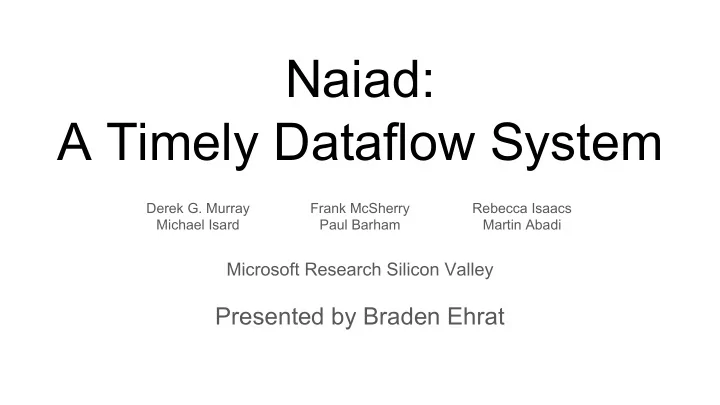

Naiad: A Timely Dataflow System Derek G. Murray Frank McSherry Rebecca Isaacs Michael Isard Paul Barham Martin Abadi Microsoft Research Silicon Valley Presented by Braden Ehrat
Batch Stream Graph processing processing processing
Batch Stream Graph processing processing processing ● Hadoop ● Storm ● GraphLab ● Dryad ● MillWheel ● PowerGraph
Batch Stream Graph processing processing processing Timely dataflow with Naiad
Timely dataflow A new computational model for stream processing ● Supports feedback loops ● Stateful vertices with arbitrary data ● Notifications for end of epoch
Low-latency, incremental stream processing < 100ms interactive queries < 1s < 1ms iterations batch updates
Dataflow Stage Connector
Dataflow: parallelism Vertex B C Edge
Messages B.S END B Y (edge, message, time) B C D ✉ C.O N R ECV (edge, message, time) Messages are delivered asynchronously
Notifications C.S END B Y (_, _, time) D.N OTIFY A T (time) B C D ✉ No more messages at time or earlier D.O N R ECV (_, _, time) D.O N N OTIFY (time) Notifications support batching
Progress tracking Epoch t is complete E.N OTIFY A T (t) A B C D E C.O N R ECV (_, _, t) C.S END B Y (_, _, t ʹ ) t ʹ ≥ t
Dataflow: iteration
Progress tracking C.N OTIFY A T (t) B C A E D Problem: C depends on its own output
B.S END B Y (_, _, (1, 7)) C.N OTIFY A T ((1, 6)) C.N OTIFY A T (t) A.S END B Y (_, _, 1) E.N OTIFY A T (?) E.N OTIFY A T (1) B C A E D F Advances timestamp and loop counter D.S END B Y (1, 6) Solution: structured timestamps in loops
Simple API class DistinctCount<S,T> : Vertex<T> { Dictionary<T, Dictionary<S,int>> counts; void OnRecv(Edge e, S msg, T time) { if (!counts.ContainsKey(time)) { counts[time] = new Dictionary<S,int>(); this.NotifyAt(time); } if (!counts[time].ContainsKey(msg)) { counts[time][msg] = 0; this.SendBy(output1, msg, time); } counts[time][msg]++; } void OnNotify(T time) { foreach (var pair in counts[time]) this.SendBy(output2, pair, time); counts.Remove(time); } }
Evaluation All-to-all exchange throughput Naiad exchanges 8-byte records between all processes Shows low, linear overhead
Global barrier (Iteration) latency Evaluates time to achieve global coordination No data was exchanged Effect of micro-straglers seen at 50-60 nodes
Real world calculations Twitter follower graph • 42M nodes • 1.5B Edges • 6GB on disk PageRank on Twitter followers
Real world calculations Vowpal Wabbit: Open- source distributed machine learning Naiad is on-par with specialized implementations
Query Latency Compute connected components and top tweets • 32,000 tweets/s • 10 queries/s Fresh: queries delayed behind updates 1s delay: querying stale but consistent data
Conclusions Timely Dataflow in Naiad achieves: • The performance of specialized frameworks • Generic flexibility Open source: http://github.com/MicrosoftResearchSVC/naiad/
Recommend
More recommend